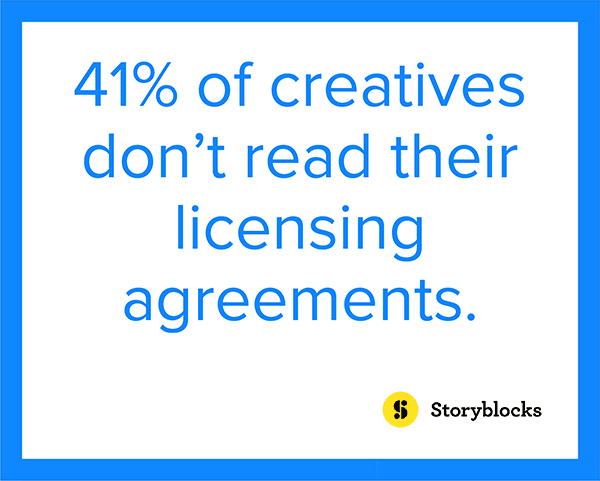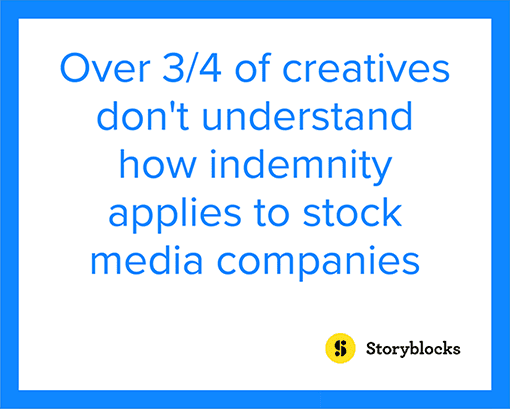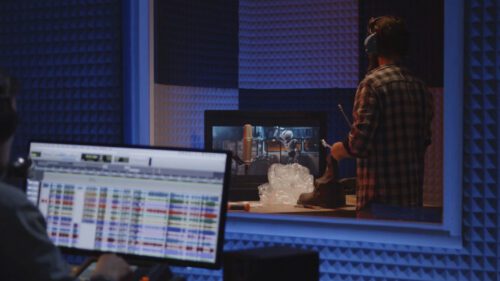I get it, stock content licensing can be complicated. The world of intellectual property law is full of fuzzy language, baffling jargon, and inconsistencies. Most creative professionals want to do the right thing when it comes to licensing stock content, but without a legal background, it can be a struggle to figure out what the “right thing” is.
It can be tempting to treat licensing agreements the same way we treat most long terms of service. Most of us briefly skim them—or sometimes ignore them altogether—and hope for the best.
While cozying up with a copy of your licensing agreement may not sound like your cup of tea, it’s one of the best things you can do for your career. You don’t have to work at a big company for licensing laws to matter, either. Freelancers and creatives at startups, SMBs, and large corporations alike should all understand the legal-ese behind the stock they use to protect themselves. New rights management technology makes it easier for creatives to combat copyright infringement, and content ID claims on platforms like YouTube and Instagram have skyrocketed. Overly aggressive algorithms work to automatically recognize music and images that could be in violation of copyrights, meaning more creatives are getting dinged for intellectual property issues. It’s important to remember that when it comes to licensing, creatives are all held to the same standards.
You likely don’t have a team of intellectual property lawyers on call, but there are a few simple preemptive steps you can take to help protect yourself against common content licensing pitfalls—meaning you can spend more time creating and less time worrying.
1. Read your stock licensing agreements—yes, all of them
 Brace yourself for the truth—There is no universal licensing agreement for stock media companies. One stock company may allow more flexibility with their content than another. Some companies may put limits on commercial usage and production budget, while others may limit geographic distribution and number of views. Within the same stock media company, your allowed usage may vary based on the media type you download, the plan you’re on, and the amount you pay.
Brace yourself for the truth—There is no universal licensing agreement for stock media companies. One stock company may allow more flexibility with their content than another. Some companies may put limits on commercial usage and production budget, while others may limit geographic distribution and number of views. Within the same stock media company, your allowed usage may vary based on the media type you download, the plan you’re on, and the amount you pay.
I know. It’s frustrating. Stock licensing agreements can be put together in a seemingly endless array of configurations, but many creatives prefer to assume that they’re all the same. In our recent survey, a large majority of creative professionals said they think media licensing is important, but only 41% fully read their licensing agreements.
We also found that 31% of Storyblocks users assume they can use our content in a way that isn’t supported by our standard licensing agreement. On the other hand, a third of our members (33%) think our standard licensing agreement is actually more restrictive than it is.
At Storyblocks, we pride ourselves on providing users with easily digestible licensing terms so they can spend more time creating and less time worrying about the legal stuff. Seriously, check out our licensing agreement—it’s barely two pages. Now that you’ve seen ours, maybe it’s time to read through your other company’s, too?
2. Make sure your licensing agreement is holding the correct person or property accountable
Many of our users have indicated that they’re not sure who coughs up the cash to cover damages in the event of a copyright dispute. The short answer isn’t particularly satisfying—it could be anyone. It all depends on who the claimant decides to pursue. Any employee or company involved in distributing or using copyright material could potentially be tapped to pay up. It could be your client, your stock media company, or even you as an individual.
Findings from our survey also revealed that only 20% of our users believed they could individually be held responsible for damages. If your content licensing agreement is written to you rather than your company, you can be dragged into the mix. Even if you’re freelancing for a limited liability company (LLC), if the license isn’t written directly for the business, you’re putting yourself at risk. A good rule of thumb for when you’re using stock media on behalf of a business is to make sure the license is made out to the business, and not you as an individual.
3. Get a legal guarantee
 While full-blown copyright lawsuits are rare, when they do happen they cost more than you’d expect. With damages, fines, and attorney and court fees, things really add up. That’s why it’s important to find out if your stock company provides indemnification coverage.
While full-blown copyright lawsuits are rare, when they do happen they cost more than you’d expect. With damages, fines, and attorney and court fees, things really add up. That’s why it’s important to find out if your stock company provides indemnification coverage.
If you don’t know what indemnification means in relation to stock media, you’re not alone. Over 3/4 (76.5%) of creatives don’t understand how indemnity applies to a stock media companies.
So what is it? Essentially, indemnification is a legal guarantee. Your stock media company is guaranteeing that the video, image or audio files that you bought from them are not going to get you in trouble—as long as you use them in ways that are consistent with your licensing agreement. If a complaint is filed and you’re required to pay damages, reputable stock companies will cover the damages up to a set amount included in your agreement.
At Storyblocks, to ensure our stock content is worry-free, we’re willing to put our own money behind our guarantee.
4. Sharing isn’t always caring
Sharing raw files with others is always an area of controversy. (In this case, a raw file refers to the unaltered clip, image or audio file you download directly from your stock vendor).
As a first step, check to see if your licensing agreement is a single or is a multi-seat license. If it’s a multi-seat license, make sure you know how many people can access the raw file at any one time. The quickest and easiest way to violate a content licensing agreement is to share the raw files with those who aren’t licensed to access the content. If you do this, you’re voiding any legal guarantees and open to legal action.
5. If you don’t understand something, check with a lawyer
Since we know licensing agreements can get complicated, at Storyblocks we created our agreement with the intention of making it straightforward and easy to understand, with or without a law degree. However, if you read through ours, or another company’s agreement and still have questions, it’s time to lawyer up.
Only a lawyer can offer legal advice. While customer service reps and salespeople may be able to help, only a lawyer can definitively tell you how a licensing agreement applies to your particular situation or business.
Content licensing agreements can be tricky, but it’s important to understand them and protect yourself from legal action. Want to know more about Storyblocks’ agreement? Check out our license comparison page to see exactly what we cover.



